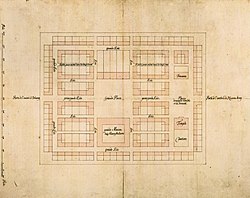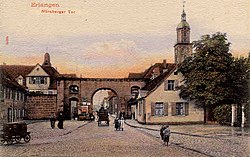Erlangen
Erlangen (German pronunciation: [ˈɛɐ̯laŋən] (![]() listen); East Franconian: Erlang) is a German city in the state of Bavaria. About 105,000 people live there.
listen); East Franconian: Erlang) is a German city in the state of Bavaria. About 105,000 people live there.
 | |
Location of Erlangen
Lua error in Module:Infobox_mapframe at line 118: attempt to index field 'wikibase' (a nil value).
| |
| Coordinates: 49°35′N 11°1′E / 49.583°N 11.017°ECoordinates: 49°35′N 11°1′E / 49.583°N 11.017°E | |
| Country | Germany |
| State | Bavaria |
| Admin. region | Middle Franconia |
| District | Urban district |
| Subdivisions | 9 city districts |
| Government | |
| • Lord mayor | Florian Janik (SPD) |
| Area | |
| • Total | 76.95 km2 (29.71 sq mi) |
| Elevation | 279 m (915 ft) |
| Population (2016-12-31)[1] | |
| • Total | 110,238 |
| • Density | 1,432.59/km2 (3,710.40/sq mi) |
| Time zone | UTC+01:00 (CET) |
| • Summer (DST) | UTC+02:00 (CEST) |
| Postal codes | 91052, 91054, 91056, 91058 |
| Vehicle registration | ER |
| Website | www |
Erlangen is near to Nuremberg (Nürnberg). Both cities share the University Erlangen-Nürnberg.
Erlangen Media
Certificate of Holy Roman Emperor Henry II from 1002, first mentioning Erlangen
Ruins of the Veste Erlangen, around 1730
The ground plan of 1721 shows the integration of Erlangen Neustadt and the reconstructed old town into the baroque overall concept. Coloured copper engraving (1721) by Johann Christoph Homann, published by Johann Baptist Homann
Stolpersteine with the names of murdered Erlangen Jews in front of the building Hauptstraße 63
A plaque on the Schlossplatz commemorates the Nazi book burnings.
References
- ↑ "Fortschreibung des Bevölkerungsstandes". Bayerisches Landesamt für Statistik und Datenverarbeitung (in German). January 2018.
{{cite web}}: CS1 maint: unrecognized language (link)
Other websites
![]() Media related to Erlangen at Wikimedia Commons
Media related to Erlangen at Wikimedia Commons











